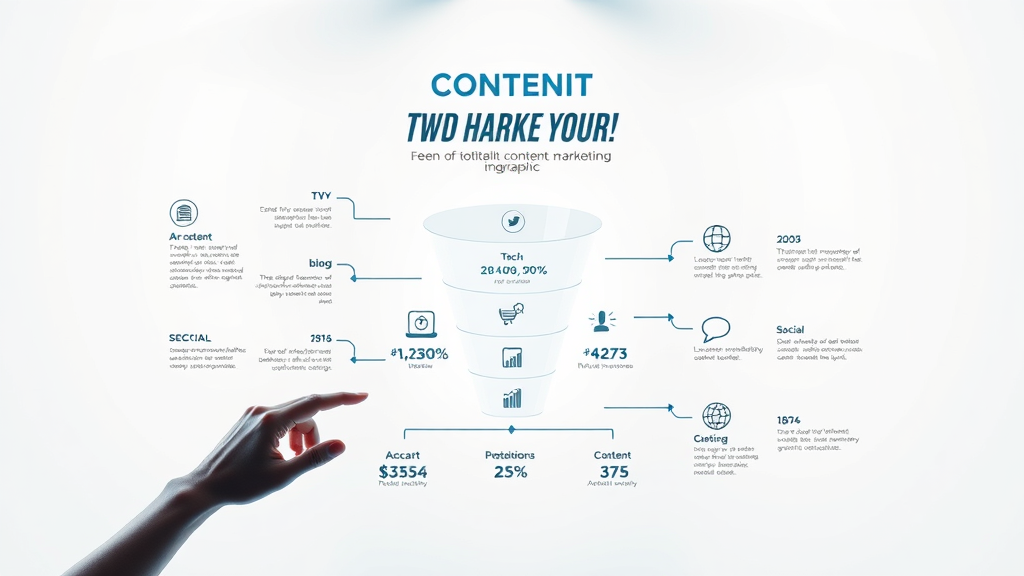Hook: What if you could transform your entire marketing strategy with just one fresh content idea? Imagine building brand awareness, engaging your target audience, and establishing thought leadership—all with action-ready concepts you can use today. If you’ve ever struggled to find content marketing ideas that truly connect, this guide is your go-to resource.

Are You Struggling to Find Fresh Content Marketing Ideas That Truly Connect?
Let’s face it—a single content idea can set a brand on fire or fizzle out before it reaches your target audience. In today’s content-saturated landscape, even the most experienced content marketer can hit a creative block. But the key to effective content marketing isn’t about reinventing the wheel; it’s about consistently creating content that speaks to your audience’s pain points, establishes thought leadership, and boosts brand awareness . Practical content ideas don’t just fill your calendar; they drive measurable business results. Whether you’re brainstorming your next blog post, planning a viral social media series, or mapping a compelling video content funnel, creative content ideas unlock engagement at every step of the buyer’s journey. This mega-list of 156 actionable ideas takes the guesswork out of brainstorming, giving content marketers in any industry proven starting points. From blog posts and infographics to email newsletters and interactive quizzes, you’ll find content marketing inspiration to fit every platform and format—plus strategies to craft winning content for your target audience . Let’s dive in and energize your strategy with game-changing ideas that resonate and convert.
Key Insights: Transform Your Approach to Content Marketing Ideas
- How to generate 156 actionable content marketing ideas for any industry
- Proven strategies for building brand awareness and thought leadership
- Examples of effective content and content formats that resonate with your target audience
- Tools and templates for building a successful content marketing strategy
- How to select the right type of content for each platform
- Ways to track and optimize your content marketing efforts

| Content Type | Format Examples | Engagement Potential | Best for Audience |
|---|---|---|---|
| Blog Posts | How-tos, Thought Leadership, Lists | High—search visibility, comment interaction | Educational audiences, B2B, B2C |
| Social Media | Short posts, Stories, Polls | Very High—shares, likes, real-time feedback | Brand awareness, real-time engagement |
| Video Content | Explainers, Live Q&A, Tutorials | Exceptional—watch time, social shares | Visual learners, entertainment seekers |
| Email Newsletters | Curated content, Tips, Announcements | Medium to High—direct clicks, repeat engagement | Subscribers, loyal followers |
| Podcasts | Interviews, Industry Insights, Series | Steady—loyal, returning audience | Busy professionals, commuters |
| Infographics | Data Visualization, Process Breakdowns | High—visual shares, backlinks | Analytical audiences, educators |
Unlocking the Essentials: What Are Content Marketing Ideas and Why Do They Matter?
Defining Content Marketing Ideas for Content Marketers
A content marketing idea is more than just a quick topic for your next blog post ; it’s a strategic foundation that underpins your marketing efforts. For a content marketer , ideas spark fresh ways to inform, entertain, and guide your audience through their journey. From planned blog posts to innovative video content , these ideas help create content that addresses audience pain points and sparks brand conversations. The best content ideas are those that align with your business objectives, match your brand voice, and offer tangible value to your target audience. Whether you’re aiming to become a thought leader in your space or keep your audience engaged with a unique content format , a well-defined idea bridges the gap between creativity and strategy. Thoughtful ideation is how content marketers become industry innovators.

The Role of Effective Content in Modern Marketing Strategy
Effective content marketing elevates your brand from being just another voice online to being a true thought leader . Success today depends on a robust marketing strategy where every piece of content is purposeful, audience-driven, and optimized for search engine relevance. When content is created strategically, it doesn’t just drive traffic; it builds trust, deepens relationships, and encourages repeat engagement across your chosen platforms. Modern brands understand that every part of their content strategy—from well-written blog posts to bite-sized social media updates—should solve real customer pain points. The right mix of formats, like explainer videos or interactive infographics, keeps your messaging fresh while meeting audience needs. For content marketers, this means moving beyond basic promotional material to creating content that educates, inspires, and converts at every stage of the marketing funnel.
Content Marketer Perspectives: Success Stories and Pitfalls
Many content marketers have experienced both the thrill of viral success and the frustration of lackluster results. What sets top performers apart is their willingness to experiment with a wide variety of content ideas while closely measuring performance. For example, one SaaS company shifted its focus from long-form guides to dynamic video content and saw its average conversion rate double within three months. However, pitfalls await those who fail to align their content with audience interests or overlook the importance of a strong content calendar. Prioritizing quantity over quality or neglecting feedback loops can drain resources and produce minimal ROI. Success hinges on consistently testing formats, repurposing evergreen ideas, and listening to your audience’s feedback—because even the best content strategy is only as effective as its real-world impact.
The Anatomy of a Winning Content Marketing Strategy

Building a Target Audience-Driven Content Calendar
A high-impact content marketing strategy starts with understanding your target audience and mapping your content calendar around their preferences, habits, and pain points. The most effective brands invest time in audience research—using analytics, surveys, and direct feedback to identify what content formats drive the most engagement and which messages resonate. When building your calendar, mix evergreen blog posts and timely social media campaigns, plus regular updates via email, podcasts, or video content. Grouping your ideas by monthly themes or buyer journey stages ensures every piece of content supports marketing goals, minimizes creative slumps, and keeps your feeds vibrant. With a well-planned calendar, content marketers can anticipate industry trends and fill gaps before competitors do.
Choosing the Right Content Format for Your Goals
Your type of content should always support your overarching goals. Looking to establish thought leadership? Long-form articles, whitepapers, and webinars might be your go-to. Want real-time engagement? Quick social media videos, polls, and live Q&A sessions perform best. A proven content marketing strategy blends several formats— blog posts to drive organic traffic, striking infographics for shareability, and video content or podcasts for depth and personality. Always consider your audience's preferred consumption habits and the platforms you’re targeting. Analytics on past performance can reveal which content formats lead to higher engagement, longer session times, and better conversion rates.
“Content marketing is the only marketing left.” – Seth Godin
The Ultimate List: 156 Content Marketing Ideas for Audience Engagement
- 1. Thought Leadership Articles Demonstrate Expertise
- 2. Social Media Series for Brand Awareness
- 3. Educational Blog Posts that Solve Audience Problems
- 4. Behind-the-Scenes Videos to Build Trust
- 5. Infographics that Simplify Complex Data
- 6. Customer Testimonials and Case Studies
- 7. Interactive Quizzes to Foster Engagement
- 8. Email Newsletters with Curated Content Ideas
- 9. Podcasts Featuring Industry Thought Leaders
- 10. Live Q&A Events with Content Marketers
- ...and 146 more actionable content marketing ideas

Organizing Blog Posts and Blog Post Series for Maximum Impact
The power of a well-structured blog post series cannot be overstated. Grouping your content ideas into themes—such as a month-long campaign on industry pain points or a multi-part tutorial—keeps readers coming back for more and strengthens your brand's authority. Consistent, value-driven series create a logical progression, build anticipation, and help establish you as a reliable thought leader in your space. Not only does this approach maximize SEO potential with internal links and keyword clusters, but it also meets audience needs at every stage of their journey. Consider supplementing blog post series with related downloadable assets, short recap videos, or social media teasers to expand your reach and give each piece of content extended longevity.
Integrating Social Media Content Marketing into Your Strategy
Effective social media content marketing requires more than random posting; it needs strategic planning and creative execution. To amplify each content idea , tailor your messaging, visuals, and format to the specific rules and audience preferences of each platform. Use data-backed insights to identify which content types—stories, carousels, polls, or live streams—resonate best with your followers. Integrating social media with your overall content calendar keeps messaging consistent and amplifies brand awareness. Collaborate with influencers and other thought leaders to extend your organic reach. Blending graphics, interactive content, and short-form videos into your social strategy guarantees higher engagement and cements your position as a proactive, resourceful content marketer.
Leveraging Video Content to Captivate and Convert
With video consumption skyrocketing, video content is now a must-have in every content marketer’s toolkit. Short explainer videos, behind-the-scenes peeks, and live events not only humanize your brand but also deliver complex ideas quickly and memorably. Studies show that video boosts average time on page and increases conversion rates better than nearly any other content format. Integrate video content across your platforms—inserting product demonstrations on your website, launching weekly tips on social media, and even repurposing webinars as gated assets. Experiment with new formats, such as interactive shoppable videos or collaborative live sessions with industry thought leaders, to create a vibrant, engaging feed for your target audience.
"No content idea is too small; the right content format transforms message into impact."
Strategic Approaches for Effective Content Marketing

Aligning Types of Content With Buyer’s Journey
To maximize engagement and conversions, content marketers must match each type of content with the buyer’s journey stage. Early-stage awareness is best fueled by easily digestible blog posts, helpful infographics, and eye-catching social media snippets. As prospects move into consideration, deeper content formats—like videos, webinars, and how-to guides—answer more nuanced pain points and build trust. Decision-stage content, such as case studies, testimonials, and detailed product comparisons, seals the deal by offering proof and clarity. Aligning your topics and formats with the audience’s intent keeps your marketing strategies efficient and sharply focused on real outcomes.
Best Practices for Social Media Content Marketing
Effective social media strategies don’t just broadcast; they start and sustain conversations. Schedule content when your audience is most active, use high-quality visuals, and focus on two-way interaction—respond to comments, run live polls, and feature user-generated content to foster a true community. Content marketers should also analyze which platforms yield the greatest ROI and continuously test different content ideas, from memes and reels to Instagram carousels and LinkedIn long-form posts. This ensures your message stays relevant and your social media audience feels heard and valued.
Optimizing Blog Posts for Target Audiences
Never underestimate the power of a laser-focused blog post . Research keywords around your audience’s pain points, format for easy readability, and include actionable takeaways in every article. Add original graphics, expert quotes, and real-world examples to boost search engine authority and drive social shares. Consistency matters: develop a content calendar , repurpose evergreen blog posts as podcasts or infographics, and regularly update old content to stay ahead of trends. Always measure the conversion rate of each piece of content and tweak headlines or calls to action as needed to improve results.

Developing a Long-term Content Calendar
Think of the content calendar as the backbone of your content strategy—it ensures a consistent posting rhythm, supports big-picture planning, and lets you map your content ideas against seasonal trends, product launches, or industry events. A well-organized calendar clarifies responsibilities, prevents topic overlap, and provides analytics on which formats drive the most engagement. Leverage digital tools and templates to streamline your scheduling process, collaborate with team members, and track assignments in real time. Keep your content calendar flexible enough to accommodate trending topics and feedback from your content marketers, yet structured enough to avoid last-minute scrambles for ideas.
Evaluating and Measuring the Success of Your Content Marketing Ideas
Key Metrics for Assessing Effective Content Marketing
What gets measured gets improved—even the most creative content idea is only valuable if it drives results. Key performance indicators (KPIs) for content marketing include organic traffic from blog posts, social media shares, email open rates, and video watch times. Track the conversion rate of landing pages and analyze time on page to see which formats hold attention. Content marketers should regularly review these analytics to identify winning strategies and adjust quickly when trends shift. Look beyond vanity metrics; focus on audience retention, repeat engagement, and qualitative feedback to ensure your effective content marketing yields actual business outcomes.

Feedback Loops: Learning from Your Content Marketers
Constructive feedback from fellow content marketers is invaluable. Host regular brainstorming and review sessions to discuss which content types delivered results and where audiences lost interest. Ask for direct feedback from your audience through surveys or social media polls. Adopting a culture of learning keeps your content team agile. It also encourages innovation—prompting marketers to experiment with new formats or messaging based on real-world insights, not just intuition. Proactive feedback loops ensure the entire team stays aligned on goals while continuously refining the content marketing strategy.
Content Marketing Strategy Adjustments: When and How
Adjustments are a sign of a proactive content strategy, not a failure. If performance dips or a new content format unexpectedly outpaces your best blog post, be ready to pivot resources, update your content calendar, or even redesign campaigns based on recent analytics. Listen to your target audience and adapt messaging to shifts in behavior or emerging pain points. Regularly review your KPIs, talk to your sales and support teams, and monitor competitor innovations to identify new trends. Experiment with different content marketers’ ideas—sometimes, adding a fresh social series or launching a new video format is all it takes to revitalize engagement.
People Also Ask: Content Marketing Ideation Demystified
What is content marketing ideas?
Content marketing ideas are innovative and actionable ways to engage your audience, educate potential customers, and build meaningful relationships through targeted content formats like blog posts, social media, videos, and more. Each idea should be tailored to your brand, marketing strategy goals, and audience needs for maximum impact.

What is the 3-3-3 rule in marketing?
The 3-3-3 rule in marketing recommends focusing on three core messages, delivered three times in three different content formats. This principle ensures content marketers reinforce key points across blog posts, social channels, and email campaigns—maximizing audience retention and engagement.
What are the 3 C's of content marketing?
The 3 C's of content marketing are Content, Context, and Consistency. Content refers to the valuable information you create. Context means presenting it in a way that fits your audience’s needs. Consistency ensures a regular flow of effective content across platforms like social media, blogs, and video channels.
What is content marketing with example?
Content marketing is a strategic approach focused on creating and distributing valuable, relevant content to attract and engage a target audience. For instance, a tech company might publish step-by-step blog posts, release explainer videos, and host webinars—educating customers and positioning itself as a thought leader in its industry.

Expert Tips and FAQs: Mastering Content Marketing Ideas
- How do I brainstorm new content marketing ideas quickly? Use customer feedback, competitive research, and online tools like BuzzSumo or AnswerThePublic. Involve your content marketers in group brainstorming sessions to surface fresh content ideas, address critical pain points, and tailor solutions for your target audience.
- What platforms are best for repurposing content ideas? Blog posts can become infographics, podcasts, or social media carousels. Video content can be clipped into Instagram reels or YouTube shorts. Email newsletters can curate multiple pieces of content from your archives or recent campaigns.
- Should content marketers focus more on video content in 2024? Absolutely—video content drives higher engagement and brand awareness. Experiment with short-form videos, live streams, and webinars tailored to your audience and specific platforms for best results.
- How often should I update my content calendar? Review your content calendar at least once a month. Adjust more frequently if you notice shifts in audience behavior, see new trends, or are launching new marketing strategies.
- What’s the best way to measure the ROI of effective content? Track metrics like conversion rates, time on page, audience retention, and direct feedback. Compare these against campaign goals set at the outset of your content strategy to ensure every piece of content is driving business value.
Take Your Content Marketing Ideas to the Next Level
"Not sure where to start with online marketing? Let’s chat — the first consultation is on us. Email info@strategyadvantedge.com"
A dynamic explainer video showcasing real-world examples of successful content marketing campaigns, including highlights of creative social media series, infographics, blog posts, and video content—demonstrating their impact on audience engagement.
Conclusion
Start by prioritizing the content marketing ideas that align with your goals, map out your content calendar, experiment with new formats, and measure results—then iterate for ongoing success.
 Add Row
Add Row  Add
Add 




Write A Comment